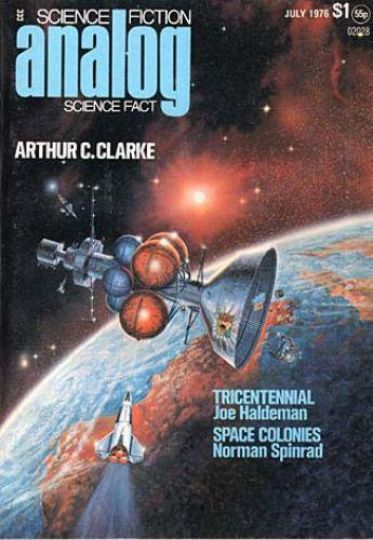Kris
Clearly SF writers liked the idea of doing a Tricentennial story as, apparently, the same year John Shirley did a story with the same title and there was an entire anthology devoted to the subject. I guess looking back and looking forward go together.
Anyway, my main thought on Joe Haldeman’s take was “competence.” It would probably not have been on my Hugo ballot if I had been around in that year as it is not entirely to my tastes and not without flaws. But for the first time since Delany, I am not actually thinking Why on earth did so many voters nominate this???It has a beginning, a middle and an end. It is readable, with some funny moments (sarcastically suggesting they might rename the ship the Leon Trotsky, was a particular highlight) and character work the brings it through. It also makes some attempts to make the science feel realistic (even if the idea of an anti-matter star they get just send a probe to get fuel from seems like a MacGuffin too far) and the petty politics feels relevant even today.
The biggest flaw with it is I cannot help but feel like I have read this a hundred times before. Even by this point time-dilation tales resulting in people finding themselves in a de-populated future are two-a-penny, whether that be Eric Frank Russell’s Second Genesisfrom 1952, or Poul Anderson’s Tau Zero, which was runner up for the Best Novel Hugo in 1971. Even Haldeman himself is obviously famous for his time-dilation story Forever War where they go on to an old-fashioned colony of humans. That novel though has a lot of interesting elements and areas of depth to recommend it. This to me just feels good but done before, a kind of middle of the road tale.
I read the rest of the shortlist and found them all pretty so-so. My ranking would probably be:
I See You
Tricentennial
Crowd of Shadows
Custom Fitting
But all were pretty close together.
Of those others I have read for ’76 my personal fave would probably be Geoff Ryman’s debut story, Diary of the Translator.
Brian
Joe Haldeman really hit the jackpot with this one, and I’m not just saying it because I do like “Tricentennial.” Appearing in the July 1976 issue of Analog? A little on the nose, but sure. And Haldeman had just done a clean sweep with The Forever War, which really do be one of the best SFF novels of the ‘70s.
But “Tricentennial” is a fine example of the more retrograde side of Bova’s Analog, which, while Bova was credited with liberalizing the magazine, he still published a lot of stuff that Campbell probably would’ve bought. Some of it, frankly, doesn’t pass the sniff test, but “Tricentennial” is a Campbellian story done well. The pacing is lightning quick, with the flashbacks and flashforwards (along with the pseudo-textbook sections, which might be my favorites) gradually revealing to us the true nature of the voyage.
I’m also reminded of Tau Zero, about a ship that doesn’t reach near lightspeed instantly but rather gradually accelerates. Of course, Anderson goes even farther by having the ship survive the crunch and rebirth of the universe, but it still feels painfully believable that Earth would basically be turned into a dustbowl within a few thousand years in Haldeman’s story.
The mid-to-late ‘70s saw SFF in a precarious spot, with the New Wave behind us but the cyberpunk movement still at least half a decade off. We hadn’t set foot on the moon since 1972, and we would never return. Hard SF authors lamented the evidently waning public interest in space travel. Of the Hugo winners this year we have Kate Wilhelm, Spider Robinson, and Isaac Asimov’s stories which are landbound, and while Tiptree’s novella is set in space… it’s Tiptree.
Haldeman’s short story is the only one to have a gosh-wow attitude towards space travel (with a dose of cynicism aimed at the lack of public backing for it), and I say, let the voters have this one. It didn’t reinvent the wheel, but it didn’t have to. Though to be honest, I probably would’ve voted for Damon Knight’s “I See You.”
Kit
The collection I’m reading from includes retrospective introductions by Haldeman written in 2013 when he was doing a best-of collection, and he says that everybody getting into writing about the tricentennial was specifically because Bova did a special issue about the tricentennial in 1976. Compared to the last several stories this gets major points just for not being in any way uncomfortable. Like, I can actually enjoy reading this; it’s just so excited about science and space travel. And then I get distracted by little details like what vacuum-distilled raw alcohol is like or the precise contours of the differences between lunar colony psychology and Earth psychology or what happened with Death Valley last time to cause such a fuss, which is itself a mark of good worldbuilding; I want to know more about the world. Looking at what Kris said above, this might be one that benefits from my comparative lack of background; it doesn’t feel trite to me because I haven’t read any of the contemporary stories that have done this before. Except the Ender sequels, but this feels less cynical and consequently I like it more. The world is very dangerous, space is very dangerous, but it’s still worth something to go. And a very message-in-a-bottle type ending, although think the ending is implying Earth blew itself up in the meanwhile, because another three thousand years shouldn’t be enough to destroy humanity without humanity doing something to cause it.

